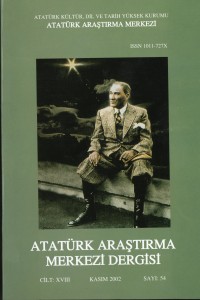Abstract
The 1917 Bolshevik Revolution has affected the way World War One was processing and the negatıve situation of Turkey in the Eastern Front. With the signing of the Brest-Litovsk Treaty betvveen Germany, Russia, Austria-Hungary and the Ottoman Empire, the first treaty of World War One was undersigned. Hovvever, it was not easy to reach thİs result; the discussions ended in a negative fashion on February 1918, and it was possible to sign the treaty on March 3, 1918. Dııring this process, the Russian delegation continued to make Bolshevik propaganda on one hand, continued to arm the Armenians on the other hand, and provoked persecution towards the Turkish-Muslim population of Eastern Anatolia and Caucasia. Their aims were not to leave the Elviye-i Selase to Turkey and to cstablish the Greater Armenia. However, they could not reach their aims due to the necessary political and military initiatives of Turkey.
References
- Yeresimos, Stefanos, Türk-Sovyet İlişkileri, Ekim Devriminden Milli Mücadeleye, İstanbul, 1979.
- Yel, Selma, Yakup Şevki Paşa ve Askerî Faaliyetleri, Ankara, 2002.
- Genel Kurmay Başkanlığı, Birinci Dünya Harbinde Türk Harbi, Kafkas Cephesi 3. Ordu Harekâtı, C. II, Ankara, 1993.
- Kurat, Akdes Nimet, Brest-Litovsk Müzakereleri ve Barışı, Belleten, XXXI/121-124, Ankara, 1967.
- ATESE, Kls, 152, D. 376-601, F. 4; Kls„ 529, D. 357-2067, F. 14.
- Çakmak, Fevzi, Büyük Harp’te Şark Cephesi Hareketleri, Şark Vilayetlerimizde Kafkasya’da ve İran’da, Ankara, 1936.
- Sürmeli, Serpil, Türk-Gürcü İlişkileri (1918-1921), Ankara, 2001.
- Uras, Esat, Tarihte Ermeniler ve Ermeni Mezalimi, İstanbul, 1987.
- Mehmetzate, Mirza Bala, Milli Azerbaycan Hareketi, Ankara,1991.
- Sakarya, İhsan, Belgelerle Ermeni Sorunu, Ankara, 1984.
- ATESE-. Kls., s. 529, D, 357-2067; F-2; ATESE, Kls. 151, D. 200-678, F. İO8-18; ATESE, Kls. 529, D. 357-2067, F. 14-3.
- ATESE, Kls., 340, D. 406-1366, F. 1-9; ATESE, Kls., s. 25, D. 1024 E 23; ATESE, KIs., 524, D. 706-2044, F. 45.
- Sabah, 24 Aralık 1917, No: 10097; İkdam. 5 Şubat 1918, No: 7539; İkdam, 7 Ocak 1918, No: 7510.
- BOA (Başbakanlık Osmanlı Arşivi), Belge No: 337222.
- ATESE, KIs. 529, D. 357-2067, F. 30; ATESE, Kis., 529, D. 357-20067, F. 38, 38-1.
- Tasvir-i Efkar, 8 Ocak 1918, No: 2335; Tasvir-i Efkar, 9 Ocak 1918, No: 2336; Tasvir-i Efkar, 19 Aralık 1917, No: 2315.
- Kurat, Akdes Nimet, Türkiye ve Rusya, Ankara, 1990.
- Parmaksızoğlu, İsmet, Ermeni Komitelerinin İhtilal Hareketleri ve Besledikleri Emeller, Ankara, 1981.
- ATESE, Kls. 2905, D. 443, F. 6-19; KIs. 153, D.380-682, F. 4-7; KIs. 529, D. 357-2067, F.98.
- ATESE, 3941, H. 13, F. 1-33, Kls., 3920, D. 86, F, 1-6.
- İkdam, 16 Ocak 1918, No: 7519; 7 İkdam, 17 Şubat 1918, No: 7551.
- Bıyıklıoğlu, Tevfik, Mondros Mütrakenamesinde Elviye-i Selâse ile ilgili Yeni Vesikalar, Belleten XXI / 84 ,Ekim 1957.
- Uran, Hilmi, Hatıralarım, Ankara, 1959.
Abstract
1917 Bolşevik İhtilâli, I. Dünya Savaşı’nın gidişatına tesir etmiş olup, Türkiye’nin Doğu Cephesi’ndeki olumsuz durumuna son vermişti. Almanya, Rusya, Avusturya-Macaristan ve Osmanlı Devleti arasında yapılan Brest-Litovsk Antlaşması ile I. Dünya Savaşı’nın ilk barışı akdedilmiştir. Fakat, bu durum bir şekilde sona ererken, antlaşmanın imzalanması ancak 3 Mart 1918’de mümkün olabilmiştir. Bu süreçte, Rus delegeleri sürekli olarak bir taraftan Bolşeviklik propagandası yaparken. Diğer taraftan da Ermeniler’i silâhlandırarak, Doğu Anadolu ve Kafkasya’da Türk-İslâm ahaliye mezalim uygulatmışlar. Amaçları, Elviye-i Selase’yi Türkiye’ye bırakmayacak Büyük Ermenistan Devleti’nİn teşkilini sağlamaktır. Ancak, Türkiye’nin lüzûmlu politik ve askeri teşebbüsleri temini ile amaçlarına nail olamamışlardır.
References
- Yeresimos, Stefanos, Türk-Sovyet İlişkileri, Ekim Devriminden Milli Mücadeleye, İstanbul, 1979.
- Yel, Selma, Yakup Şevki Paşa ve Askerî Faaliyetleri, Ankara, 2002.
- Genel Kurmay Başkanlığı, Birinci Dünya Harbinde Türk Harbi, Kafkas Cephesi 3. Ordu Harekâtı, C. II, Ankara, 1993.
- Kurat, Akdes Nimet, Brest-Litovsk Müzakereleri ve Barışı, Belleten, XXXI/121-124, Ankara, 1967.
- ATESE, Kls, 152, D. 376-601, F. 4; Kls„ 529, D. 357-2067, F. 14.
- Çakmak, Fevzi, Büyük Harp’te Şark Cephesi Hareketleri, Şark Vilayetlerimizde Kafkasya’da ve İran’da, Ankara, 1936.
- Sürmeli, Serpil, Türk-Gürcü İlişkileri (1918-1921), Ankara, 2001.
- Uras, Esat, Tarihte Ermeniler ve Ermeni Mezalimi, İstanbul, 1987.
- Mehmetzate, Mirza Bala, Milli Azerbaycan Hareketi, Ankara,1991.
- Sakarya, İhsan, Belgelerle Ermeni Sorunu, Ankara, 1984.
- ATESE-. Kls., s. 529, D, 357-2067; F-2; ATESE, Kls. 151, D. 200-678, F. İO8-18; ATESE, Kls. 529, D. 357-2067, F. 14-3.
- ATESE, Kls., 340, D. 406-1366, F. 1-9; ATESE, Kls., s. 25, D. 1024 E 23; ATESE, KIs., 524, D. 706-2044, F. 45.
- Sabah, 24 Aralık 1917, No: 10097; İkdam. 5 Şubat 1918, No: 7539; İkdam, 7 Ocak 1918, No: 7510.
- BOA (Başbakanlık Osmanlı Arşivi), Belge No: 337222.
- ATESE, KIs. 529, D. 357-2067, F. 30; ATESE, Kis., 529, D. 357-20067, F. 38, 38-1.
- Tasvir-i Efkar, 8 Ocak 1918, No: 2335; Tasvir-i Efkar, 9 Ocak 1918, No: 2336; Tasvir-i Efkar, 19 Aralık 1917, No: 2315.
- Kurat, Akdes Nimet, Türkiye ve Rusya, Ankara, 1990.
- Parmaksızoğlu, İsmet, Ermeni Komitelerinin İhtilal Hareketleri ve Besledikleri Emeller, Ankara, 1981.
- ATESE, Kls. 2905, D. 443, F. 6-19; KIs. 153, D.380-682, F. 4-7; KIs. 529, D. 357-2067, F.98.
- ATESE, 3941, H. 13, F. 1-33, Kls., 3920, D. 86, F, 1-6.
- İkdam, 16 Ocak 1918, No: 7519; 7 İkdam, 17 Şubat 1918, No: 7551.
- Bıyıklıoğlu, Tevfik, Mondros Mütrakenamesinde Elviye-i Selâse ile ilgili Yeni Vesikalar, Belleten XXI / 84 ,Ekim 1957.
- Uran, Hilmi, Hatıralarım, Ankara, 1959.
Details
| Primary Language | Turkish |
|---|---|
| Journal Section | Articles |
| Authors | |
| Publication Date | November 1, 2002 |
| Published in Issue | Year 2002 Volume: 18 Issue: 54 |


